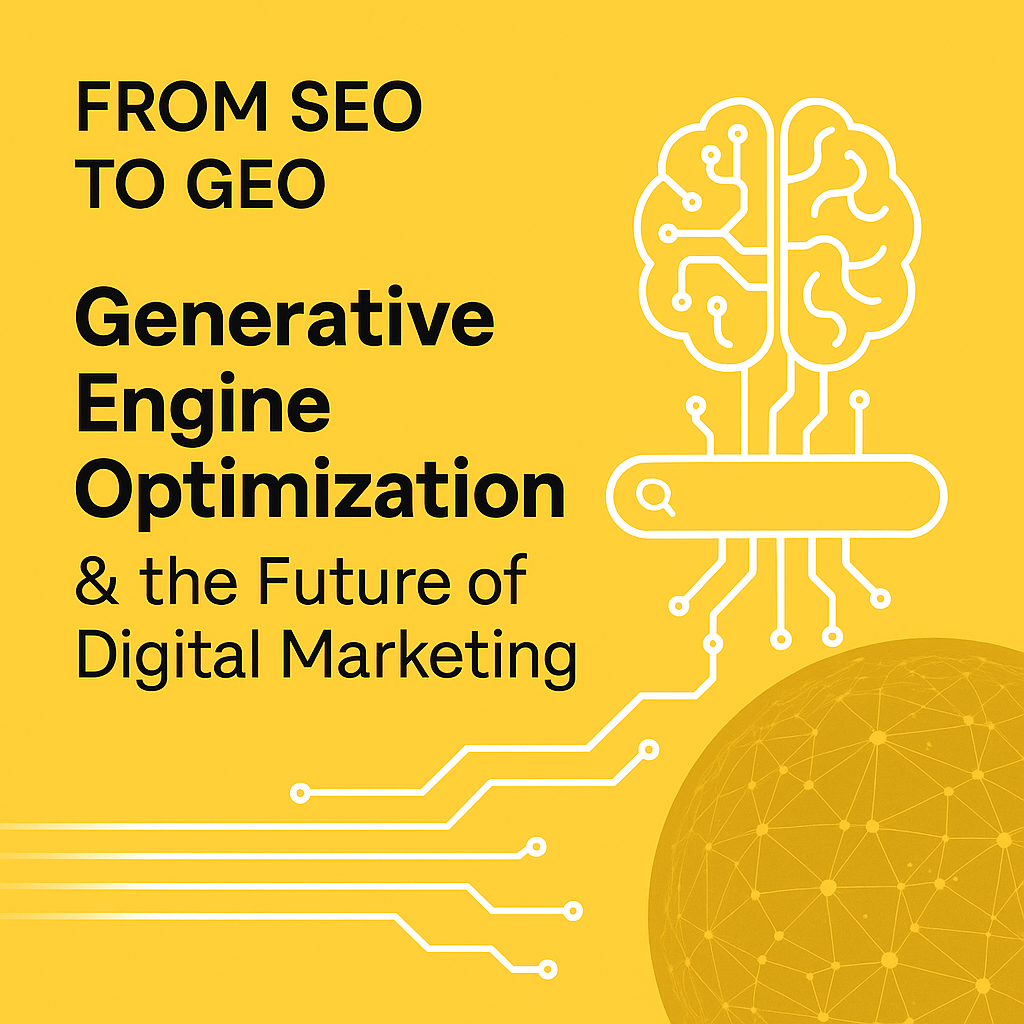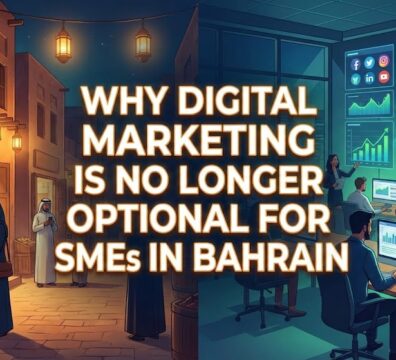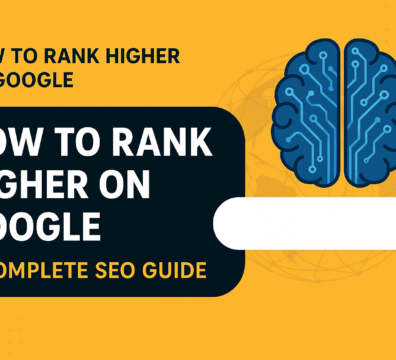In the ever-evolving world of digital marketing, we’re witnessing a significant shift—from SEO (Search Engine Optimization) to GEO (Generative Engine Optimization). While SEO has long been the foundation for achieving online visibility through keywords and backlinks, the rise of AI-driven search environments is changing the rules.

Welcome to the age of GEO—an emerging framework where context, clarity, and credibility matter more than keywords. As Google’s Search Generative Experience (SGE) and AI assistants like ChatGPT and Bing Copilot reshape how people discover information, marketers must adapt to this new AI-first ecosystem.
In this article, we’ll explore what GEO really is, why it matters, how it differs from traditional SEO, and how to optimize your content for the AI-powered search future.
💡 What is GEO (Generative Engine Optimization)?
GEO is the practice of optimizing content for AI-powered generative engines. Rather than simply chasing keyword rankings on search engine result pages (SERPs), GEO is about creating content that AI systems can:
- Discover easily
- Interpret accurately
- Summarize effectively
- Cite confidently
Think of GEO as the next evolution of SEO—designed for machines that generate answers, not just serve links.
“Search is no longer just about keywords. It’s about context, clarity, and credibility. Generative AI is changing the nature of discovery.”
— Elizabeth Reid, VP of Search, Google
📈 Why GEO is More Relevant Than Ever
1. AI Search Interfaces Are Replacing Traditional SERPs
Google’s Search Generative Experience (SGE) doesn’t just display links—it provides conversational answers compiled from multiple sources. If your content isn’t well-structured or authoritative enough to be cited by AI, it may be left out—even if it ranks on Page 1.
2. Context Over Keywords
AI tools like Gemini, ChatGPT, and Claude interpret user intent and semantic meaning, not just exact keyword matches. GEO emphasizes topic depth, readability, and trustworthiness.
3. E-E-A-T is Now Essential for AI
Google’s E-E-A-T principles—Experience, Expertise, Authoritativeness, Trustworthiness—are even more important in AI-driven environments. AI looks for clearly authored, accurate, and well-cited content to include in its answers.
“With generative AI, Google is moving toward surfacing answers from the most helpful content—not necessarily the most optimized page.”
— Danny Sullivan, Public Liaison for Search, Google
🧱 Core Elements of GEO (Generative Engine Optimization)
✅ 1. Topic Clusters and Contextual Authority
Move beyond standalone posts. Create content ecosystems using the pillar + cluster model, which helps AI understand the depth and scope of your expertise.
✅ 2. Conversational and Structured Writing
AI prefers clear, quotable, and skimmable content. Use:
- Headings & subheadings
- Bullet points and lists
- FAQs, step-by-step guides, and definitions
- Semantic HTML tags (
<section>,<article>,<aside>)
✅ 3. Entity and Schema Optimization
Use schema markup (like FAQPage, HowTo, Article) to help AI interpret content structure. Mentioning relevant entities (brands, tools, industries) improves contextual relevance.
✅ 4. Authoritativeness and First-Hand Expertise
AI rewards content with named authors, credentials, and original insights. Avoid generic writing—bring in case studies, personal anecdotes, and quotes.
✅ 5. Zero-Click Optimization
Your content may be cited in AI-generated answers without generating clicks. GEO ensures your content is AI-visible, even in zero-click environments.
🛠️ How to Implement GEO on Your Website
🎯 A. Content Strategy
- Focus on long-form, multi-intent content
- Use tools like Clearscope, Surfer, or MarketMuse for topic modeling
- Address “People Also Ask” and long-tail queries
🔧 B. Technical Optimization
- Add schema.org tags (Article, FAQ, Author)
- Use canonical URLs and ensure mobile responsiveness
- Optimize for Core Web Vitals and page speed
👨⚖️ C. Build Credibility
- Show authorship, bios, and publish dates
- Link to trusted external sources
- Add case studies, testimonials, and data-backed content
🧠 D. Structured Knowledge Formats
- Include FAQs, How-Tos, and definition boxes
- Add visual summaries, infographics, and step-by-steps
- Use structured data for breadcrumbs, organization, and author info
📊 GEO vs. SEO — A Real-World Example
| Strategy | SEO-Optimized Title | GEO-Optimized Title |
|---|---|---|
| Traditional SEO | Top 5 Social Media Marketing Tips | |
| GEO Optimization | 5 Proven Social Media Strategies Backed by Case Studies (2024) |
In the GEO version, the content is:
- Supported by real examples
- Authored by a named expert
- Embedded with schema markup
- Enhanced with internal links, FAQ, and multimedia
🔍 What Industry Experts Say About GEO
“Content designed for AI interpretation should be clear, factual, and structured. Think of it as writing not just for readers, but for co-pilots.”
— Martin Splitt, Developer Advocate, Google
“GEO means we write not only to attract but to assist AI in delivering useful answers. SEO isn’t dead—it’s evolving.”
— Lily Ray, Senior Director, Amsive Digital
✅ 2025 GEO Best Practices Checklist
- Use author bios and credentials
- Apply schema markup (FAQ, Article, Author)
- Write conversational, structured content
- Optimize for E-E-A-T
- Answer long-tail and multi-intent questions
- Build topical clusters with internal linking
- Include citations and external links
- Make content zero-click friendly
- Use multimedia (videos, infographics, visuals)
🧭 Conclusion: GEO Is Not Replacing SEO—It’s Upgrading It
As AI continues to evolve how information is accessed, SEO professionals and content creators must become experience architects. The goal now is to create content that’s interpretable by AI, trusted by users, and valuable in context.
“Your audience now includes both humans and machines. GEO ensures you’re understood by both.”
— Prabhakar Raghavan, SVP, Google Search & Ads
✅ Ready to future-proof your content marketing?
Start thinking like a human—and writing for AI.
Author: Deepu L Raj
CEO, D’Markly Digital
🌐 www.dmarkly.com
📧 info@dmarkly.com | 📞 +91(704)252-8496 | +91(114)701-0208
Empowering the Future of Digital Experiences





